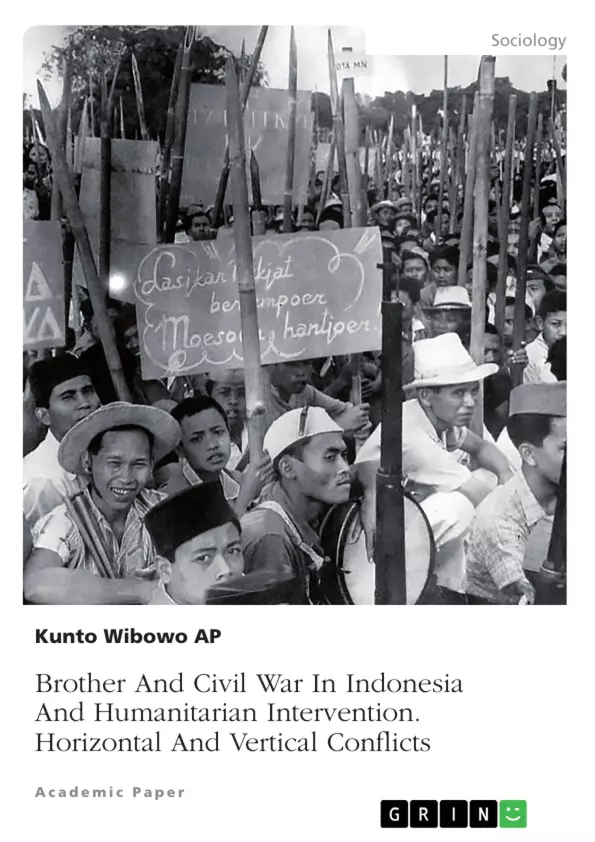Brother war means a war between two or several factions in one country. Its impact is even more fatal than war in general. For the conflict staying within the boundaries, distrust develops within the citizens and the risk of greater and greater conflict arises. Therefore, brother war has a big influence on the development and progress of a country and threatens its existence.
In a nation with a multicultural population, the potential for friction is particularly high. Indonesia is such a nation and in fact, there have been several armed conflicts in the past. But can all conflicts in Indonesia which have been named brother wars really be understood as civil wars? What are the potential causes of civil wars in Indonesia? Is there a possibility of humanitarian intervention?
Kunto Wibowo AP examines the general causes of civil wars focusing on Indonesian history. Indonesia has a very heterogeneous culture, ethnicity, language and religion. Conflicts have taken place due to very different reasons. For it is important to have a good understanding of this subject, Wibowo analyzes the Indonesian conflicts and their respective causes. He points to the many dangers of brother war and civil wars and recommends an increased national vigilance to all Indonesians in order to prevent divisions resulting in future brother wars.
Table of Contents
- Introduction
- Methods
- Discussion
- Analysis Using Soft System Methodology (SSM)
- Conclusions
- Recommendations
Objectives and Key Themes
This paper examines the occurrence of brother war in Indonesia and its potential categorization as a civil war. It investigates the underlying causes of these conflicts and explores the possibility of humanitarian intervention. The paper seeks to understand the dynamics of internal conflicts within a multicultural and geographically diverse nation like Indonesia, highlighting the significance of national unity for its survival.
- Brother war in Indonesia and its relationship to civil war.
- Potential causes of civil wars in Indonesia.
- The concept of humanitarian intervention in the context of Indonesian conflicts.
- The role of national unity and its importance for Indonesia's survival.
- The impact of brother war on the development and progress of Indonesia.
Chapter Summaries
- Introduction: This chapter introduces the concept of brother war and its distinctions from civil war. It highlights the increase in brother war incidents since the end of the Cold War and discusses various definitions and interpretations of the terms. It also explores historical examples of brother war within Indonesia, tracing back to the pre-colonial era.
- Methods: This chapter details the research methodology employed in the paper, which combines deductive and desk study methods. The paper uses secondary data analysis with a phenomenological approach to uncover the shared meaning and interpretations of brother war in Indonesia.
- Discussion: This chapter analyzes the potential causes of brother war in Indonesia, exploring theories of human aggression and psychological motives. It examines various cases of internal conflicts, including the Struggle of the Universe, the Revolutionary Government of the Republic of Indonesia, the Darul Islam/Indonesian Islamic Army rebellion, and the 1999 Ambon conflict. The chapter further delves into the inter-ethnic conflict in Kalimantan and the complexities of conflict resolution in Papua. It concludes by analyzing whether these conflicts constitute civil war based on a comparative understanding of the terms.
Keywords
This paper focuses on the core concepts of humanitarian intervention, brother war in Indonesia, the causes of civil war, and the importance of national unity for the survival of Indonesia. It explores the dynamics of internal conflicts within a multicultural and diverse country like Indonesia, highlighting the challenges of conflict resolution and the need for peaceful coexistence. The study emphasizes the complex interplay between political, social, economic, and cultural factors in shaping the emergence and persistence of brother war.
Frequently Asked Questions
What is the difference between "brother war" and civil war in Indonesia?
A brother war refers to conflicts between factions within one country. While many Indonesian conflicts are called brother wars, not all meet the strict academic criteria of a full-scale civil war.
What are the main causes of internal conflicts in Indonesia?
Causes include extreme cultural and religious heterogeneity, psychological motives of human aggression, and historical political rebellions like the Darul Islam or the 1999 Ambon conflict.
Is humanitarian intervention possible in Indonesian conflicts?
The paper explores this concept, discussing how international standards for intervention might apply to severe internal conflicts that threaten human rights and stability.
How does Indonesia's multiculturalism affect its stability?
While diversity is a strength, it also creates high potential for friction. National vigilance and unity are essential to prevent divisions from turning into armed conflicts.
What methodology was used to analyze these conflicts?
The research employs Soft System Methodology (SSM) along with a phenomenological approach to understand the shared meanings and causes of brother wars.
- Arbeit zitieren
- Kunto Wibowo AP (Autor:in), 2020, Brother And Civil War In Indonesia And Humanitarian Intervention. Horizontal And Vertical Conflicts, München, GRIN Verlag, https://www.grin.com/document/903945



